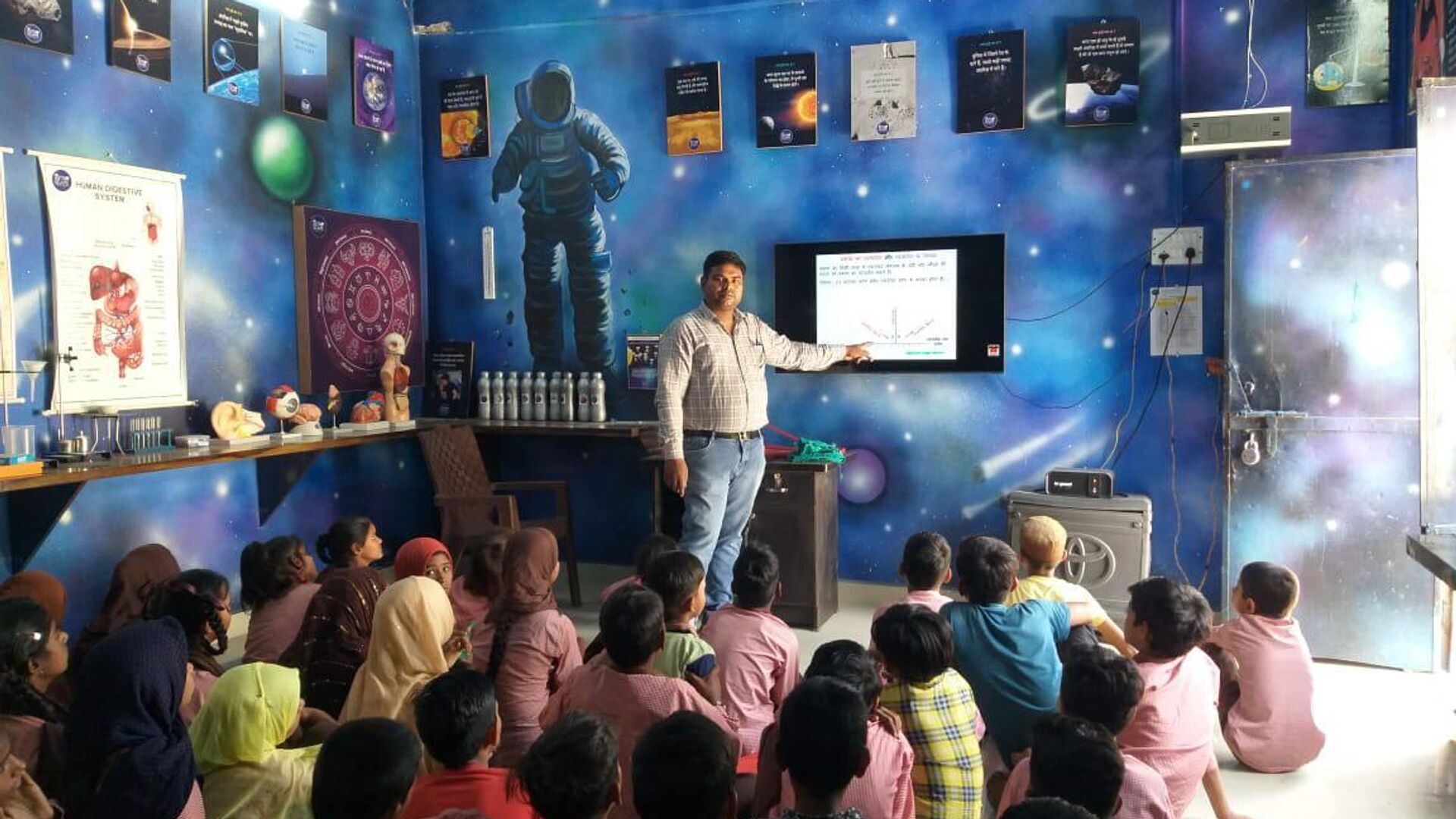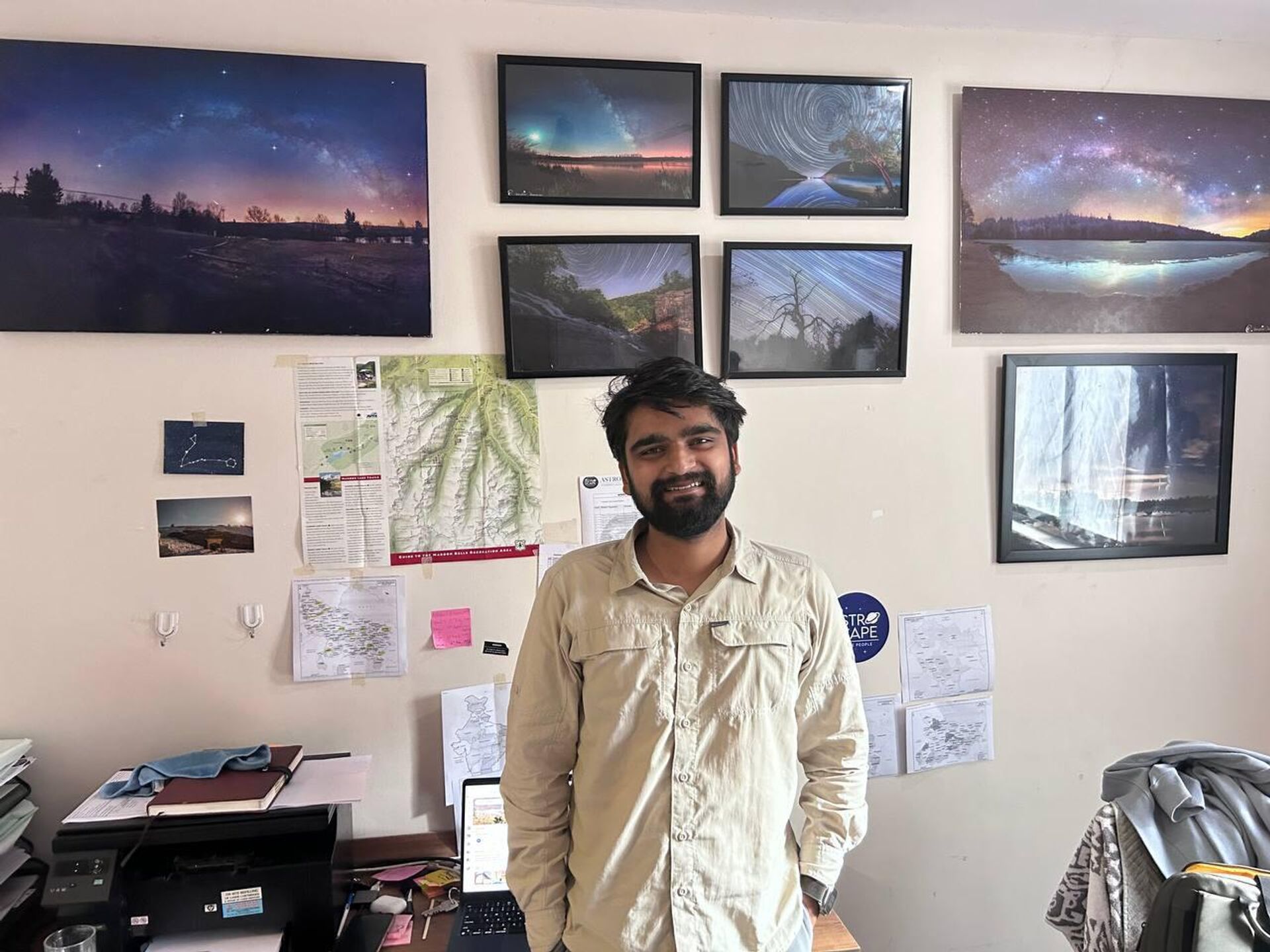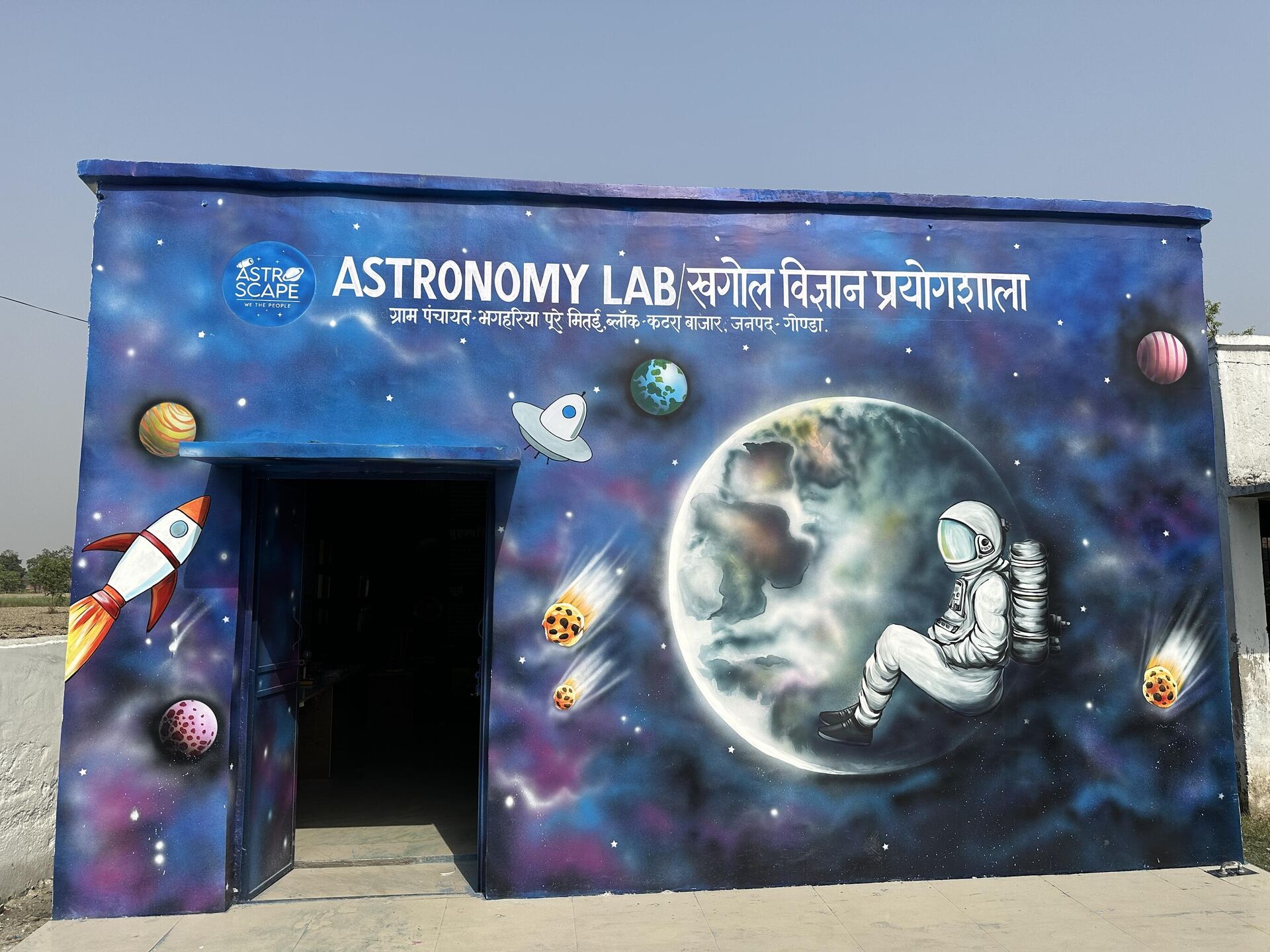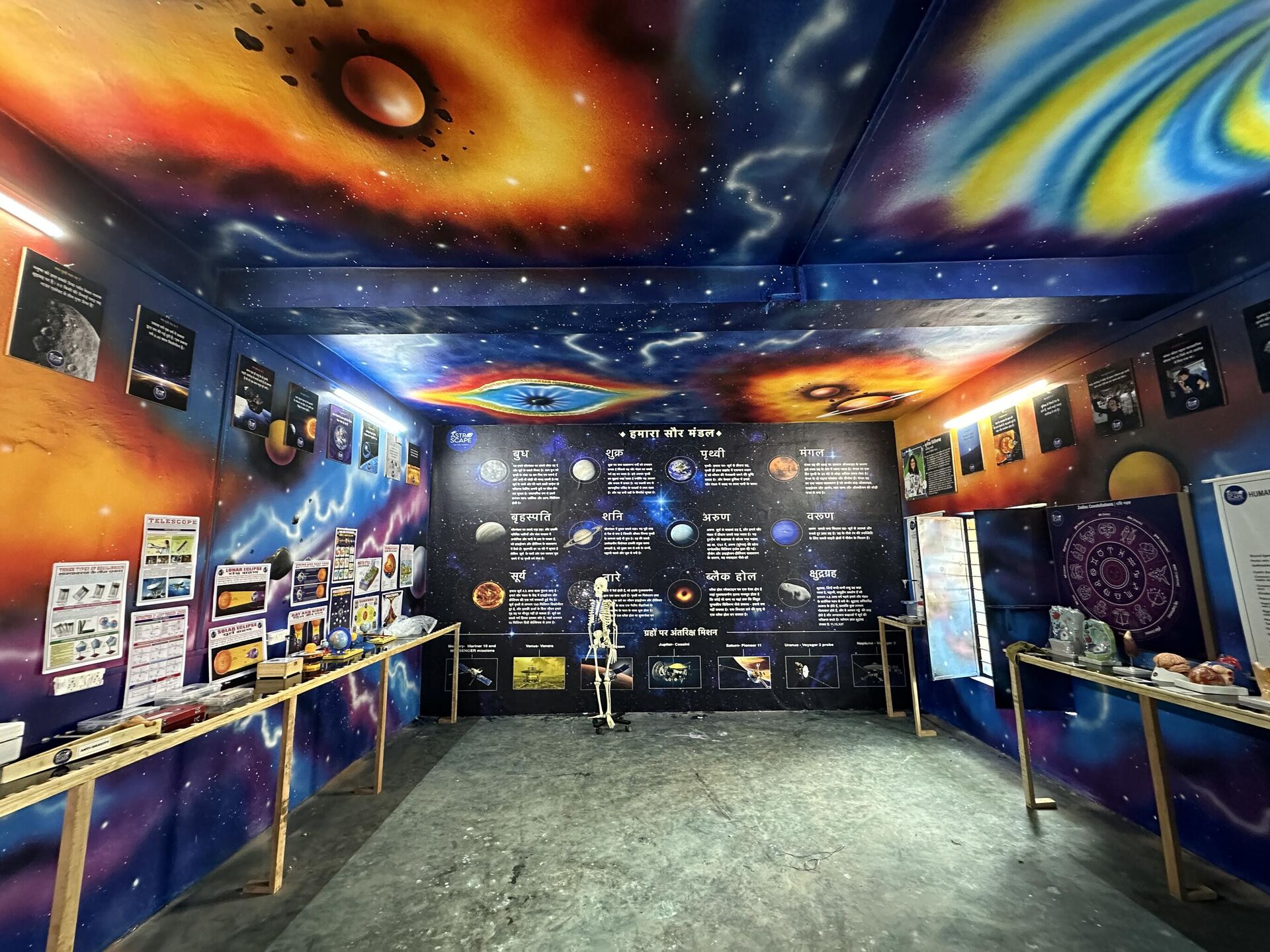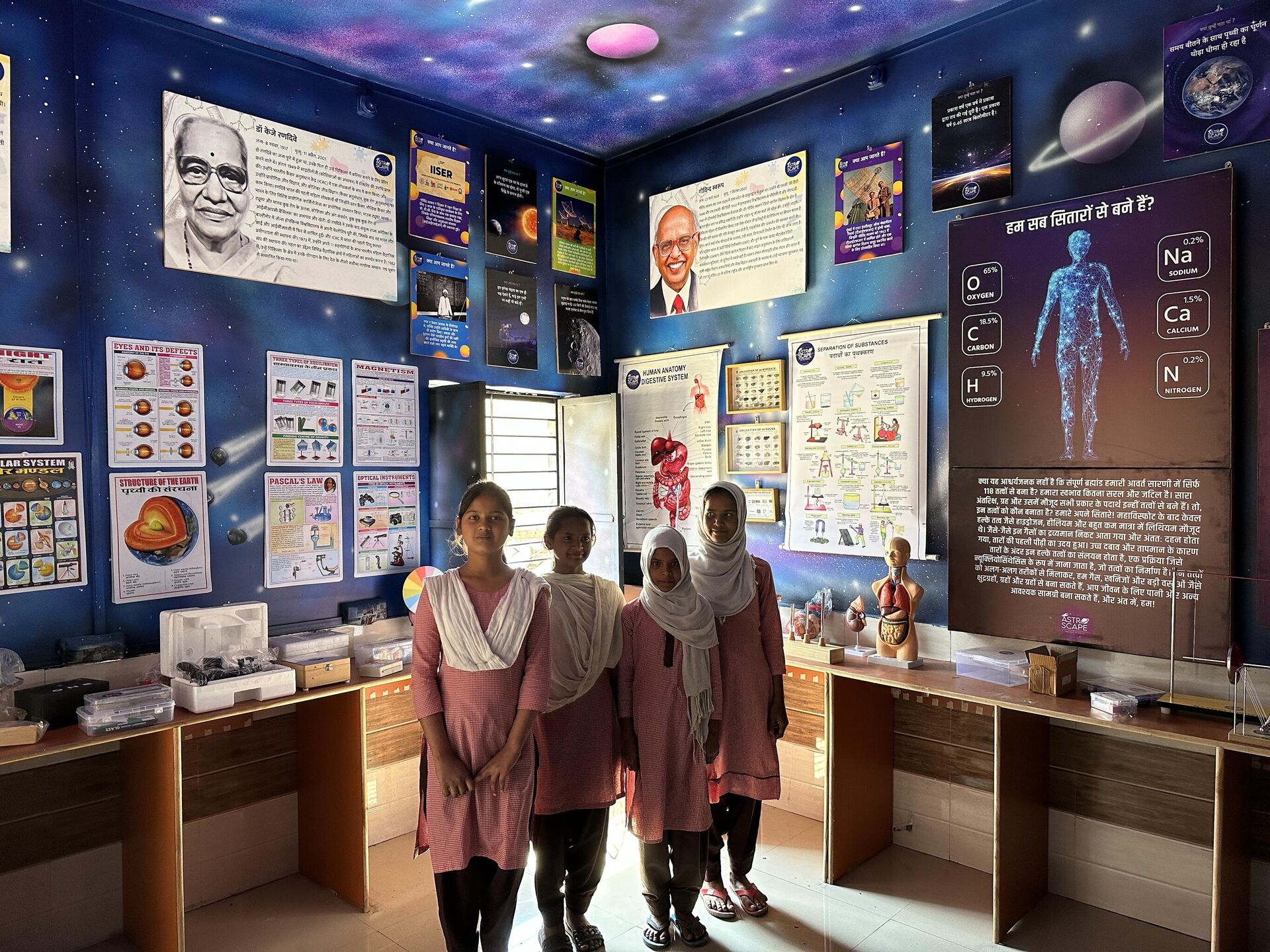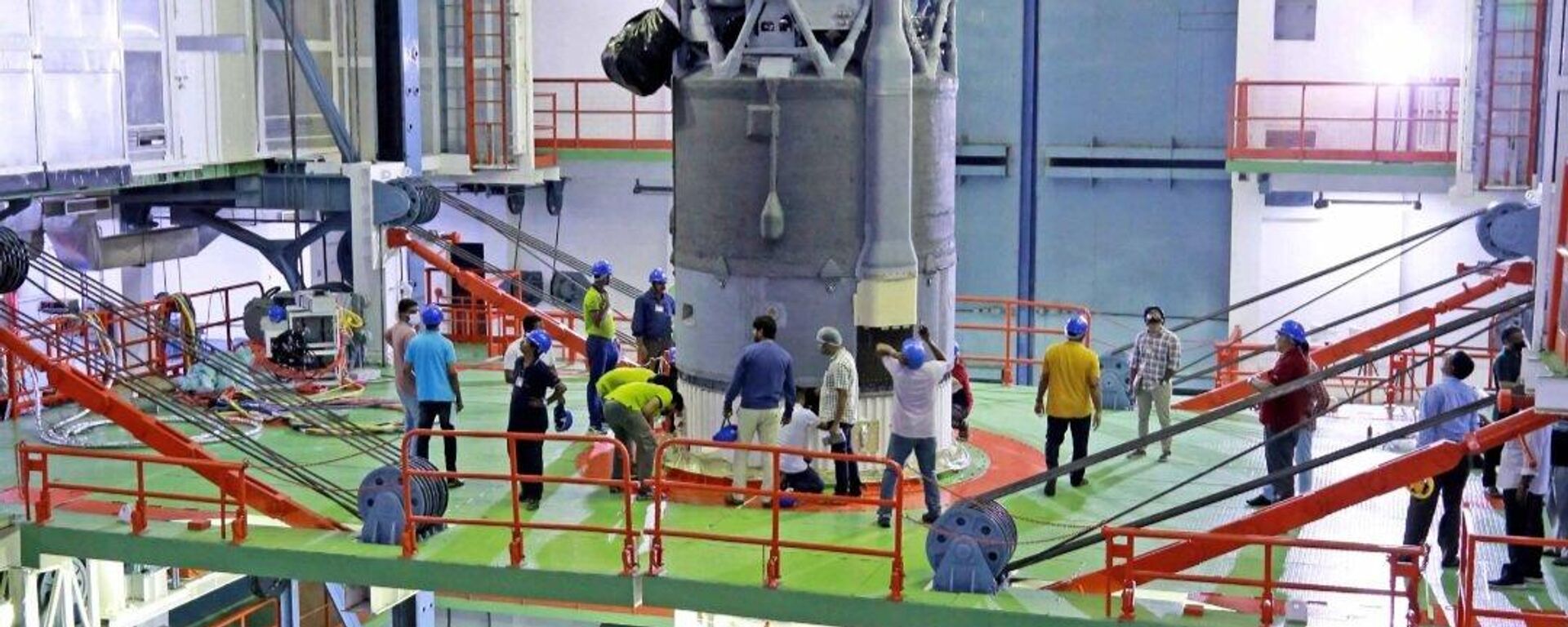https://sputniknews.in/20231208/poverty-made-me-entrepreneur-says-indian-startuaper-who-set-up-150-astronomy-labs-5739199.html
'Poverty Made Me Entrepreneur': Indian Who Opened Over 150 Astronomy Labs
'Poverty Made Me Entrepreneur': Indian Who Opened Over 150 Astronomy Labs
Sputnik India
Sputnik India visited and met with self-made astronomer and entrepreneur Aryan Mishra, who is now setting up astronomy labs in rural parts of India. Mishra shared his love for the sky and work in a detailed interaction.
2023-12-08T11:03+0530
2023-12-08T11:03+0530
2023-12-13T19:38+0530
science & tech
india
delhi
mars
sputnik exclusives
space satellite
space industry
space exploration
space rocket
rural india
https://cdn1.img.sputniknews.in/img/07e7/0c/08/5753391_0:108:1152:756_1920x0_80_0_0_3101c873c9628fdc38cdfba0477d77d7.jpg
When one walks into his office, one immediately feels the smell of fresh paint and cardboard. The first thought that comes to mind is that perhaps some renovation work is going on.Many people dream of becoming an entrepreneur at a young age. They work hard, attend top colleges, meticulously plan every step for years. However, even with all this effort, there is no guarantee that their business idea will be successful. But for Mishra, the founder of Spark Astronomy at the age of 18, and now Astroscape, the motivation to become an entrepreneur was different. Establishing Astronomy Lab in Rural IndiaWith the support of district administrations, Mishra in Astroscape is establishing affordable astronomy laboratories in schools throughout India, placing special focus on government schools.Laboratories built by his startup today provide a 6inch Dobsonian telescope for skywatching. The labs also have working models that Mishra makes using recycled materials. So far, he has established 185 labs across the country. Mishra said that when he worked in a village and set up such labs, people appreciated his work. They greatly respected such labs or any initiative which is going to help their children to learn. "City people have acces to planetariums, attend lectures at fancy places. These things are not happening in villages or small towns. One just needs to go 90 km beyond cities and you'll see the situation. We (people living in cities) are only seeing the part of 40 square feet and [we are] happy in it. The technologies and things are not really able to reach villages", Mishra opined.Self-Made AstronomerMishra's father is a newspaper vendor in Delhi. He was raised in the streets of the city and said he was always a curious child – asking questions and wanting to know more. The young entrepreneur called himself a self-made astronomer and said he had no Internet or mobile phone to pursue his interests at home. He said that cybercafes helped him at the time. In 2014, he was awarded for discovering an asteroid between Mars and Jupiter as part of an outreach program hosted hosted by the International Astronomical Search Collaboration (IASC) and SPACE India.Between his journey from running to cyber cafes and libraries and attending lectures, he realised that many students in India needed to be exposed to the domain of outer space.The stargazer said he had no idea where to start to become an astronomer. "The only thing I knew that I needed science stream in eleventh standard. And, then I had no money to continue studying… My poverty told me to be an entrepreneur, and that's why I am here". Mishra eventually completed his bachelor of science in physics from Ashoka University. Sustainability and Looking Forward Mishra is worried that the labs his company is making are not enough. He has plans to work with institutes that can send their researchers or scholars to these labs and educate students. "I'm a one man show. My startup total has four people and we travel across the country. I cannot maintain these labs on my own. I want private institutes to come forward and work on it", Mishra said.India's Success in Space Inspires YouthThe budding astronomer feels that 2023 was crucial for India as it made a successful touchdown at the Moon's south pole, inspiring many students in rural India. Mishra also shared that people on social media appreciate his work daily, feel proud about it, and write good remarks. Meanwhile, Mishra's two-room office in Delhi has many photographs of stars, which is also called astronomical imaging. He spoke with admiration of how he stays up at night to take these photographs and how he travels through mountain towns of the Himalayas for them.
https://sputniknews.in/20231115/isro-invites-youth-to-design-robotic-rovers-for-future-space-missions-5409343.html
india
delhi
mars
rural india
Sputnik India
feedback.hindi@sputniknews.com
+74956456601
MIA „Rossiya Segodnya“
2023
Deexa Khanduri
https://cdn1.img.sputniknews.in/img/07e6/0c/13/138923_52:0:533:481_100x100_80_0_0_cadf23d341691fc65ff2b22fd1afe584.jpg
Deexa Khanduri
https://cdn1.img.sputniknews.in/img/07e6/0c/13/138923_52:0:533:481_100x100_80_0_0_cadf23d341691fc65ff2b22fd1afe584.jpg
News
en_IN
Sputnik India
feedback.hindi@sputniknews.com
+74956456601
MIA „Rossiya Segodnya“
Sputnik India
feedback.hindi@sputniknews.com
+74956456601
MIA „Rossiya Segodnya“
Deexa Khanduri
https://cdn1.img.sputniknews.in/img/07e6/0c/13/138923_52:0:533:481_100x100_80_0_0_cadf23d341691fc65ff2b22fd1afe584.jpg
aryan mishra, who is aryan mkshra, aryan mishra interview, spark astronomy, astroscape, astronomy lab in rural india, affordable astronomy laboratories, love for space, space story, cybercafés, asteroid searching group.
aryan mishra, who is aryan mkshra, aryan mishra interview, spark astronomy, astroscape, astronomy lab in rural india, affordable astronomy laboratories, love for space, space story, cybercafés, asteroid searching group.
'Poverty Made Me Entrepreneur': Indian Who Opened Over 150 Astronomy Labs
11:03 08.12.2023 (Updated: 19:38 13.12.2023) Deexa Khanduri
Sputnik correspondent
Sputnik India has visited and met with self-made astronomer and entrepreneur Aryan Mishra, who is setting up astronomy labs in rural parts of India. Mishra shared his love for the sky and work in a detailed interaction.
When one walks into his office, one immediately feels the smell of fresh paint and cardboard. The first thought that comes to mind is that perhaps some renovation work is going on.
"No, it's not a construction work. It's the way we work", 23-year-old Aryan Mishra, the founder of Astroscape, told Sputnik India.
Many people dream of becoming an entrepreneur at a young age. They work hard, attend top colleges, meticulously plan every step for years. However,
even with all this effort, there is no guarantee that their business idea will be successful. But for Mishra, the founder of
Spark Astronomy at the age of 18, and now
Astroscape, the motivation to become an entrepreneur was different.
"I was driven to become an entrepreneur because I had no financial means to pursue further education. It wasn't a matter of choice for me", he shares.
Establishing Astronomy Lab in Rural India
With the support of district administrations, Mishra in
Astroscape is establishing affordable astronomy laboratories in schools throughout India, placing special focus on
government schools.
"Each lab costs INR 225,000 ($2,700). They're for students for class 1-10 grade, it has 50 working models and 70 equipment. The labs cover all streams of science – biology, chemistry and physics", Mishra said while describing his work.
Laboratories built by his startup today provide a 6inch Dobsonian
telescope for skywatching. The labs also have working models that Mishra makes using recycled materials.
So far, he has established 185 labs across the country.
Mishra said that when he worked in a village and set up such labs, people appreciated his work. They greatly respected such labs or any initiative which is going to help their children to learn.
"Villagers make incredible use of the instrument. You know why? Because they do not have access to it. They have not seen it earlier", he shared.
"City people have acces to planetariums, attend lectures at fancy places. These things are not happening in villages or small towns. One just needs to go
90 km beyond cities and you'll see the situation. We (people living in cities) are only seeing the part of 40 square feet and [we are] happy in it. The technologies and things are not really able to reach villages", Mishra opined.
Mishra's father is a newspaper vendor in
Delhi. He was raised in the streets of the city and said he was always a curious child – asking questions and wanting to know more.
"I was young, and very much fascinated with whatever I was seeing around – planes, stars, everything. I just wanted to know more. I want to know what lies behind solar system, why we see stars at night and not in daytime. That quest started when I used sleep on the terrace in summer and one evening I got an opportunity at my school ground, I saw Saturn through a telescope and that was a turning point in my career", Mishra shared.
The young entrepreneur called himself a self-made astronomer and said he had no Internet or mobile phone to pursue his interests at home. He said that cybercafes helped him at the time.
"I did everything by sitting in a cyber cafe. And, that's what inspired me, and I ended up being part of an asteroid-searching group from a cyber cafe", he said.
In 2014, he was awarded for discovering an asteroid between
Mars and Jupiter as part of an outreach program hosted hosted by the International Astronomical Search Collaboration (IASC) and SPACE India.
Between his journey from running to cyber cafes and libraries and attending lectures, he realised that many students in India needed to be exposed to the domain of
outer space.
"Astronomy is very expensive. A decent telescope cost around INR 35,000 ($420) and this goes up to millions. In the beginning for six-seven years, I had a very small telescope that cost INR 7,000 ($84)", Mishra shared.
The stargazer said he had no idea where to start to become an astronomer. "The only thing I knew that I needed
science stream in eleventh standard. And, then I had no money to continue studying… My poverty told me to be an entrepreneur, and that's why I am here".
Mishra eventually completed his bachelor of science in physics from Ashoka University.
Sustainability and Looking Forward
Mishra is worried that the labs his company is making are not enough. He has plans to work with institutes that can send their
researchers or scholars to these labs and educate students.
"I'm not looking for money or any funding partnership. But, many students in our villages have the potential to become astronauts or great scientists, but they do not have guidance… Can we bridge that?" he asked.
"I'm a one man show. My startup total has four people and we
travel across the country. I cannot maintain these labs on my own. I want private institutes to come forward and work on it", Mishra said.
India's Success in Space Inspires Youth
The budding astronomer feels that 2023 was crucial for India as it made a successful
touchdown at the Moon's south pole, inspiring many students in rural India.
Mishra also shared that people on
social media appreciate his work daily, feel proud about it, and write good remarks.
Meanwhile, Mishra's two-room office in Delhi has many photographs of stars, which is also called astronomical imaging. He spoke with admiration of how he stays up at night to take these photographs and how he travels through mountain towns of the
Himalayas for them.
